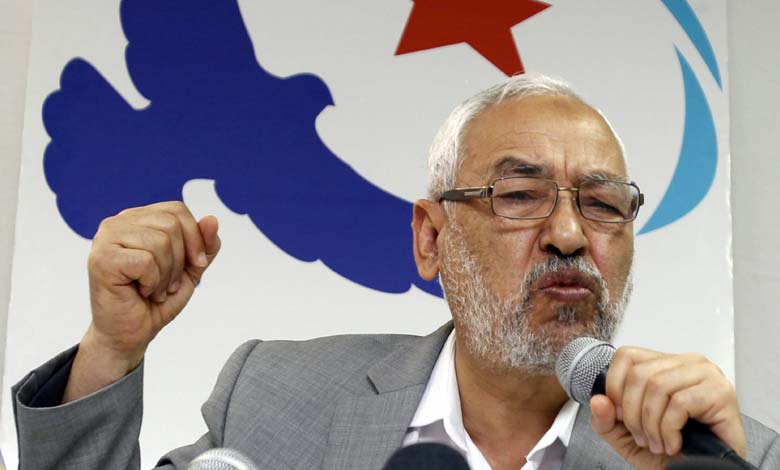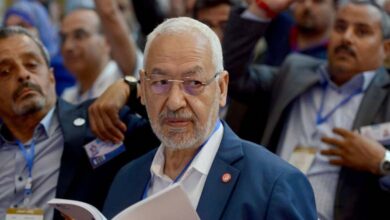Descendants of the Muslim Brotherhood and Ennahdha Movement: Tunisian Calls to Ban the Radical Hizb ut-Tahrir Party

Tunisian MP Najla Lahiani has called for the suspension of Hizb ut-Tahrir’s activities due to its radical and takfirist views, noting that the party considers “anyone participating in the presidential elections, either as a candidate or voter, as an infidel.” She expressed surprise that Tunisian authorities continue to allow this party to operate freely.
-
Referral of Several Ennahdha Leaders to the Anti-Terrorism Pole
-
Analysts Reveal Ennahdha Movement’s Plans to Ignite Tensions in Tunisia
Lahiani said, “This party carries within it a deadly poison, raising the black flag with religious slogans that contradict the principles of the Tunisian Republic and the values of a civil state.”
She confirmed that she had fulfilled her duty by reaching out to the authorities, but the Public Prosecutor at the Primary Court of Ariana Governorate (in the capital) did not see any harm in allowing Hizb ut-Tahrir to continue its activities.
-
Tunisian Analyst: Ennahdha uses false propaganda and pressures to undermine elections
-
In Tunisia, Ennahdha and the postponement of the “terrorism trial”: harsher penalty
Experts say that Hizb ut-Tahrir and the Brotherhood-affiliated Ennahdha Movement in Tunisia are “brothers” divided by politics and the issue of the caliphate. Indeed, a closer look at the evolution of these two parties over time shows that they share the same extremist ideology of political Islam, although their interests, agendas, and priorities have diverged.
On another note, the independent Tunisian Observatory for the Defense of the Civil State issued a statement warning of the threat posed by the presence of Hizb ut-Tahrir in Tunisia, noting that the party continues to operate freely, issuing statements and organizing demonstrations.
-
Ghost of the Ennahdha Movement in Tunisia… “desperate shots” to tarnish the electoral commission
-
Tunisian analyst reveals Ennahdha movement’s plan to target the state with rumors and lies
The Observatory stated that “this foreign party originated in Jerusalem in 1953, with branches in other countries, and it is banned in most Arab and Muslim nations, indicating that it follows foreign directives, constituting a blatant interference in Tunisia’s internal affairs.”
It further explained that “this party does not recognize the Tunisian state, its system, its borders, or even its flag, which it replaces with a black banner, showing its conspiracy against the Tunisian state and its security and stability by adopting a strategy of complete and radical overthrow.”
-
Tunisian Analyst: Ennahdha Faces a Fate and Challenges It Cannot Overcome
-
President of the Tunisian Rescue Front: Disintegration and collapse have affected the Ennahdha Movement
According to the Observatory, “this party, which seeks to impose a caliphate system in Tunisia, does not recognize the values of the Republic, democracy, universal human rights principles, or the civil nature of the state; instead, it spreads regressive and dangerous ideas rooted in extremist and outdated interpretations of Islam, aiming to drag Tunisia into darkness and regression.”
The Observatory expressed surprise at the state’s failure to confront “this imminent threat,” “sounding the alarm once again and calling on civil society, organizations, and the broader Tunisian society to oppose this party, demanding an immediate decision to dissolve it.”
-
The Muslim Brotherhood’s Ennahdha is on its way to collapse… Details
-
Experts reveal the truth about expectations of dissolving the Tunisian Ennahdha movement after its terrorist acts?
It should be noted that Hizb ut-Tahrir was banned under the late Presidents Habib Bourguiba and Zine El-Abidine Ben Ali. After Ben Ali’s ouster in 2011, the government of Béji Caïd Essebsi, which led the country until the first free elections, refused to grant the party legal recognition.
This continued until 2012 when the party was licensed under the “first troika” government led by Hamadi Jebali, former Secretary-General of the Muslim Brotherhood-affiliated Ennahdha Movement.
-
The Tunisian state is nearing a decision to dissolve the Ennahdha Brotherhood… Details
-
Sahbi Atigue, the terrorist and leader in Ennahdha, after his arrest – Who is he?












